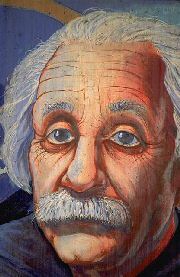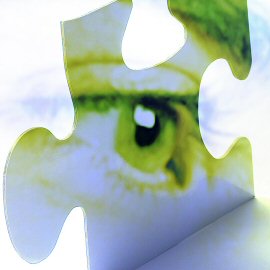9 December 2005
Do We Need A New Kind of Science?
By Rusty Rockets
 From time to time science involves working with current knowledge and then, in order to break new ground, moving on to speculation, imagination, and even fantasy for inspiration. It was Einstein who remarked that: "Imagination is more important than knowledge," and: "If we knew what we were doing, it would not be called research, would it?" So, with the caveats out of the way, what could be so intriguing and mysterious that it requires such an introduction? No less than the very fringes, or perhaps frontline, of scientific discovery itself.
From time to time science involves working with current knowledge and then, in order to break new ground, moving on to speculation, imagination, and even fantasy for inspiration. It was Einstein who remarked that: "Imagination is more important than knowledge," and: "If we knew what we were doing, it would not be called research, would it?" So, with the caveats out of the way, what could be so intriguing and mysterious that it requires such an introduction? No less than the very fringes, or perhaps frontline, of scientific discovery itself.
It's a cheap shot when discussing the boundaries of science to rabbit on about how mysterious it all is, and embellish the musings of serious scientists to fit some new age philosophy. While they hide behind a thin veil of the most recent findings in physics, films such as What the Bleep Do We Know exploit the gaps in our scientific knowledge so much so that their main points often differ very little from fantasy films like The Matrix. Presenting physics to the public in this way ("if you close your eyes, does the room you stand in still exist?") blurs the line between fantasy and reality far too much. Notwithstanding this, it's always important to ask just where this boundary exists, and how scientists begin to address such large scale, fundamental problems as, say, reconciling the quantum and classical worlds without departing from known scientific methodology.
Stephen Wolfram, a mathematical genius who earned a doctorate from Caltech at age 20, is one individual who would agree that our current models are too disparate and deficient to explain our complex Universe in its entirety. In 2002, after years of research, Wolfram published his controversial work A New Kind of Science (ANKS). What followed were accusations ranging from plagiarism to outright dismissal of his theory. What caused the uproar? Central to Wolfram's ideas is the claim that one simple programming model, rather than a complicated and inefficient mathematical language, will best describe the Universe in which we reside. Following from this, he believes that this computational model must be investigated experimentally, and doing so will reveal much about the natural world and the Universe we live in. The controversy arises when Wolfram states that a new science exploring computational models for their own sake should be pursued. Wolfram's suggestion of a new science explains the word kind in the title of his book, as this new kind of science supposedly stands outside the perimeters of mainstream science.
One area that Wolfram covers in his 1200 page thesis is the cellular automaton, the study of an infinite grid of cells and their relationship to one another and discrete instances of time. Each cell has two possible states, black or white, and 8 neighboring cells, which allows a total of 512 possible patterns for the nine cells to form. When a set of rules are applied to such a simple system some remarkably diverse behaviors begin to emerge across the grid. The most recognized and popular of these is Conway's Game of Life inspired by Von Neumann's concept of a self-replicating machine. The idea behind such explorations is that complexity can be derived from quite simple beginnings. Wolfram developed what is now known as "elementary cellular automata," that would later form the basis for ANKS. He devised a rule, called rule 110, used to "program" cells on the aforementioned grid that exhibited behavior that could neither be called random or repetitive. This was called "class 4 behavior" by Wolfram and it apparently defies all known mathematical explanations. Wolfram's research assistant later devised a proof that showed this rule was in fact universal, and that it could therefore be a representation of the patterns inherent in nature.
But scientists are not about to abandon their methodological rules for exploring the Universe so easily. Many say that there is nothing new about Wolfram's science at all, claiming that a number of great minds had already visited the problem by the time he had begun his own exploration; and what's worse, he didn't even acknowledge their efforts. Furthermore, Wolfram fails to refer to the great body of work dedicated to the study of complexity, and neither does he follow any kind of accepted scientific methodology or make any attempt at mathematical definition. Others believe that his cellular automaton theory can be dismissed as too simplistic to be an adequate explanation for evolution.
However, no matter what you think of Wolfram and the validity of his new kind of science, or whether he is standing on the shoulders of giants without acknowledging them, his theory does highlight large and fundamental gaps in our current knowledge. The fact that quantum theory and general relativity are yet to be reconciled demonstrates that current scientific methodologies may not be adequate for taking our understanding forward. If we are to assume that the Universe is one coherent system with one set of rules, then surely there must be a way in which to explain the two worlds without contradiction.
 Ultimately, Wolfram's theory claims that the Universe in which we live is comprised of information. This is a belief that he shares with a number of others, including physicist Anton Zeilinger. Zeilinger is best known for his realization of quantum teleportation and the more recent quantum interference experiments with bucky-ball molecules (the largest objects ever to have demonstrated quantum phenomena). Recently Zeilinger commented that: "quantum physics teaches us to abandon the distinction between information and reality. If reality exists and if we will never be able to make an operational distinction between reality and information, the hypothesis suggests itself that reality and information are the same. We need a new concept which encompasses both." Zeilinger accepts that there is as yet no proof for his hypothesis, but this does not detract from the hefty implication that science may need to change radically before it can move on. There are profound implications for quantum computing and cryptography if Zeilinger is correct. The algorithms that will potentially run quantum computers (QCs) and the need to scale up the numbers of qubits without decoherence to create a QC may depend on taking a different path of scientific methodology in order to understand how to make a quantum computing system work. It just may be that this understanding could arise from a simpler methodology similar to the one offered by Wolfram.
Ultimately, Wolfram's theory claims that the Universe in which we live is comprised of information. This is a belief that he shares with a number of others, including physicist Anton Zeilinger. Zeilinger is best known for his realization of quantum teleportation and the more recent quantum interference experiments with bucky-ball molecules (the largest objects ever to have demonstrated quantum phenomena). Recently Zeilinger commented that: "quantum physics teaches us to abandon the distinction between information and reality. If reality exists and if we will never be able to make an operational distinction between reality and information, the hypothesis suggests itself that reality and information are the same. We need a new concept which encompasses both." Zeilinger accepts that there is as yet no proof for his hypothesis, but this does not detract from the hefty implication that science may need to change radically before it can move on. There are profound implications for quantum computing and cryptography if Zeilinger is correct. The algorithms that will potentially run quantum computers (QCs) and the need to scale up the numbers of qubits without decoherence to create a QC may depend on taking a different path of scientific methodology in order to understand how to make a quantum computing system work. It just may be that this understanding could arise from a simpler methodology similar to the one offered by Wolfram.
The Advanced Research and Development Activity (ARDA) are a group deeply involved in quantum computing. ARDA are responsible for publishing and updating a working paper, complete with timeline, called Superconducting Approaches to Quantum Information Processing and Quantum Computing: A Quantum Information Science and Technology Roadmap. The roadmap shows that our current understanding of quantum computing is still littered with uncertainties unlikely to be overcome in the short term. Currently, there are a vast number of research institutes working on versions of QCs, but there are still problems relating to decoherence and the scalability of QCs to an operational level. Researcher Per Delsing, from Chalmers University of Technology in Sweden, and Pertti Hakonen at Helsinki University of Technology, have independently realized how qubits can be read, without decohering, by employing the use of Josephon junctions. But scalability is a problem. Delsing acknowledges that: "Minimizing�decoherence is definitely�a major issue, especially when it comes to scaling from one to many qubits."
Another problem facing quantum computing is the search to find suitable algorithms that are in fact quantum. Although the adiabatic theorem is considered important in explaining certain aspects of quantum mechanics, questions have been raised in regard to its quantum computing credentials. As Wolfram states, while certain aspects of the formalism surrounding quantum theory remain mysterious, "it has increasingly come to be believed that any fundamental theory of physics must somehow be based on it." In a September, 2005 paper entitled How Powerful is Adiabatic Quantum Computation?, researchers Wim van Dam, Michele Mosca, Umesh Vazirani pose the question: "Is adiabatic quantum computing really quantum?" A QC should have the ability to solve problems that classic computers would never be able to complete (in a reasonable amount of time). Therefore, a QC's algorithm must show a significant advantage over classical computers, but there are questions in regard to using an adiabatic system of computation. The team claims it is an uphill battle, and: "Despite numerous attempts in the last few years, it has proved to be a difficult challenge to design new quantum algorithms." Van Dam et al. conclude that: "It remains an open question whether adiabatic quantum computation can establish an exponential speed-up over traditional computing or if there exists a classical algorithm that can simulate the quantum adiabatic process efficiently." In the end, the paper is yet another reminder of the lack of connection between quantum and classical understanding.
Perhaps all the answers do actually lie in the use of a simple computational system such as the one outlined by Wolfram. It's unlikely that anyone could convincingly argue that Wolfram's new science is pseudoscience, and yet there is not a huge rush to embrace it either. It's a very appealing thought to believe that a simple theory can be used to explain everything in the Universe, but maybe the Universe is much more complex than we could ever possibly imagine; who knows? Wolfram seems fairly sure that the answers are simple. "It is my strong suspicion that the kinds of programs that I have discussed will actually in the end turn out to show many, if not all, the key features of quantum theory." Should science now depart from the more traditional methodologies and tackle these long standing problems armed with a new kind of science?
